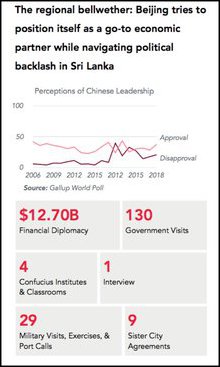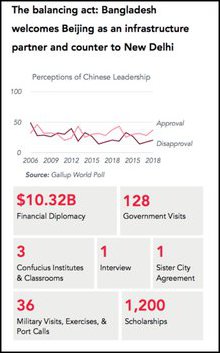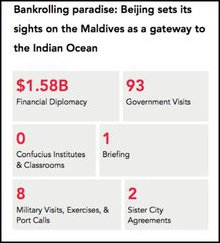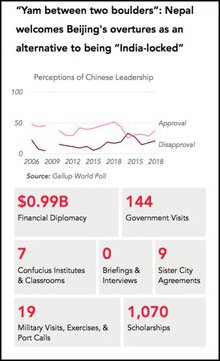US report: South Asian countries prefer economic, but not military China-ties
[TamilNet, Sunday, 15 December 2019, 22:11 GMT]
AidData, a research lab of the Virginia-based public research university, known as William & Mary, in the USA has conducted a data and interview-based research quantifying China’s public diplomacy in South and Central Asia (SCA). Beijing’s aspirations may be global, but it takes a particular interest in cultivating closer relations within China’s “greater periphery,” including the 13 countries of SCA, the report released on 10 December argues. “South Asian countries appear to be more willing to pursue economic, rather than security, ties with Beijing, given the sensitivities of being in India’s backyard,” the report notes adding that Beijing’s people-to-people diplomacy often takes a backseat to its elite-focused efforts.
The US Department of State, Asia Society Policy Institute (ASPI) and the China Power Project of the Centre for Strategic and International Studies (CSIS) have funded the study named “Silk Road Diplomacy: Deconstructing Beijing’s toolkit to influence South and Central Asia”.
The study has concentrated on four South Asian countries, Sri Lanka, the Maldives, Bangladesh, Nepal and two Central Asian states, Kazakhstan and Uzbekistan.
The report refers to SCA as compromising of Afghanistan, Bangladesh, Bhutan, Kazakhstan, Kyrgyzstan, India, the Maldives, Nepal, Pakistan, Sri Lanka, Uzbekistan, Tajikistan, and Turkmenistan.
The AidData study has categorised the tools of Chinese public diplomacy into five major groups: Cultural diplomacy (Confucius Institutes, events and friendship years); Exchange diplomacy (sister cities, student and scholarships); Elite-to-elite diplomacy (of government and military leaders); Informational diplomacy; and Financial diplomacy.
Large-scale infrastructure projects are core to Beijing’s financial diplomacy, the report says.
“Beijing has ramped up the volume and sophistication of its public diplomacy overtures in the SCA region over time, reaching its highest levels in 2014 and 2016,” was one of the critical findings of AidData’s quantifying public diplomacy efforts of China.
The report identifies Beijing as employing a diverse toolkit across the SCA countries, with sub-regional powers such as Kazakhstan, India, and Pakistan being the primary recipients.
Beijing doesn’t have a one-size-fits-all strategy, but instead appears to vary the scope and composition of how it engages with SCA countries based on its objectives, the study says.
“India’s fraught relations with these [four South Asian] countries afford Beijing an opportunity to win over foreign publics and elites as a counterbalance to New Delhi’s influence,” the study notes.
The ‘Sri Lankan’ elites are warmed to Beijing’s infrastructure financing, but the public is mostly unaware of its people-to-people overtures. The study finds that the Maldivians were uncertain while Bangladeshi political elites prefer close cooperation until a better deal comes from the other actors, and the Nepalis’ impressions are shaped by the “pain of India’s economic blockade.”

Perceptions of Chinese Leadership in Sri Lanka (2006-2018)

Perceptions of Chinese Leadership in Bangladesh (2006-2018)

Perceptions of Chinese Leadership in the Maldives [Source: Custer, S., Sethi, T., Solis, J., Lin, J., Ghose, S., Gupta, A., Knight, R., and A. Baehr. (2019). Silk Road Diplomacy: Deconstructing Beijing’s toolkit to influence South and Central Asia. December 10, 2019. Williamsburg, VA. AidData at William & Mary ]

Perceptions of Chinese Leadership in Nepal (2006-2018)











